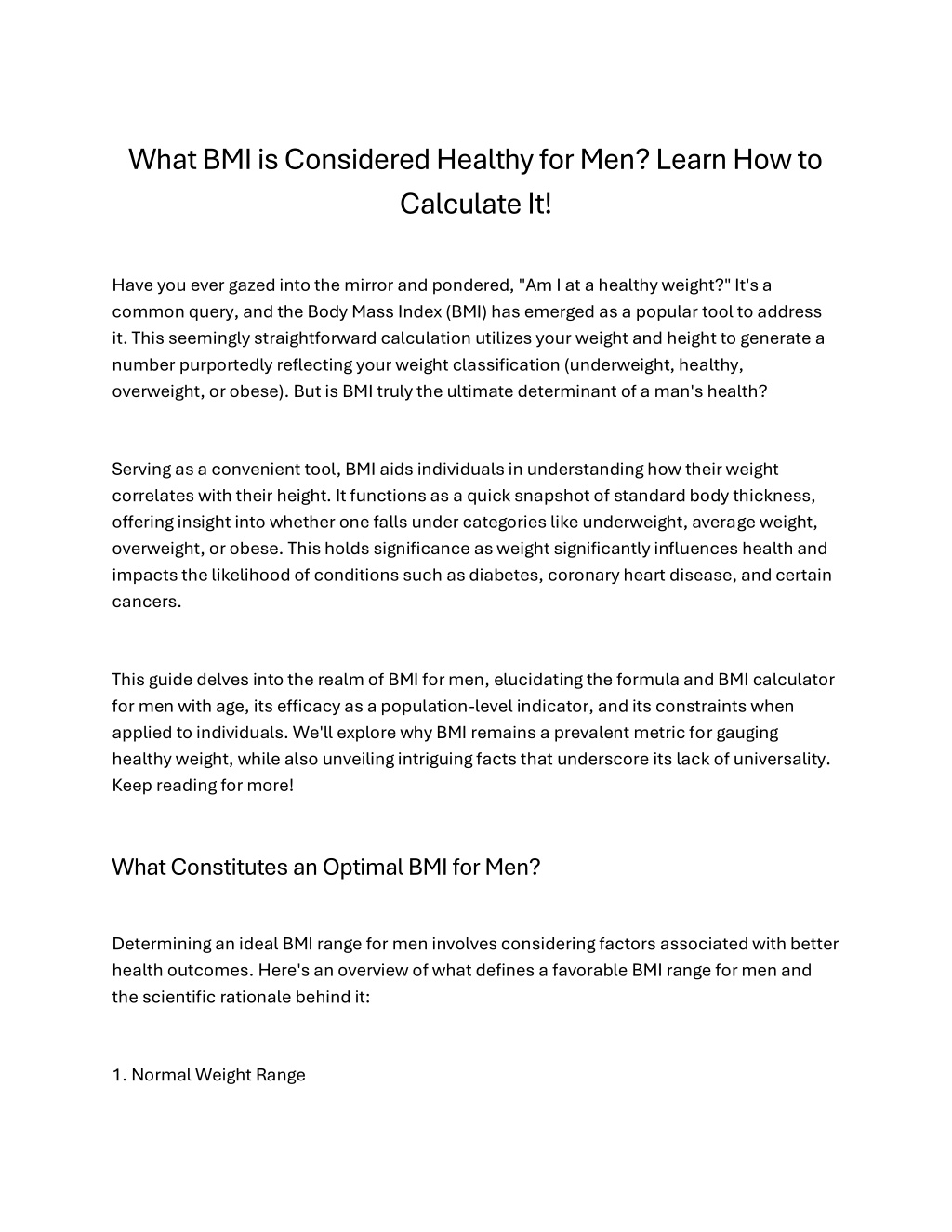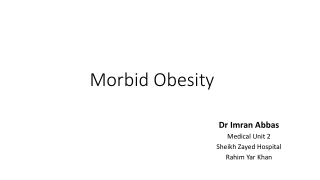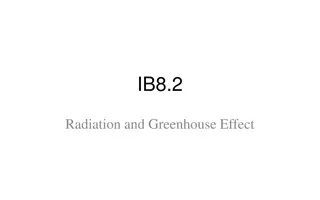
What BMI is Considered Healthy for Men? Learn How to Calculate It!
Have you ever gazed into the mirror and pondered, "Am I at a healthy weight?" It's a common query, and the Body Mass Index (BMI) has emerged as a popular tool to address it. This seemingly straightforward calculation utilizes your weight and height to generate a number purportedly reflecting your weight classification (underweight, healthy, overweight, or obese).
Download Presentation
Please find below an Image/Link to download the presentation.
The content on the website is provided AS IS for your information and personal use only. It may not be sold, licensed, or shared on other websites without obtaining consent from the author. Download presentation by click this link. If you encounter any issues during the download, it is possible that the publisher has removed the file from their server.
Presentation Transcript
What BMI is Considered Healthy for Men? Learn How to Calculate It! Have you ever gazed into the mirror and pondered, "Am I at a healthy weight?" It's a common query, and the Body Mass Index (BMI) has emerged as a popular tool to address it. This seemingly straightforward calculation utilizes your weight and height to generate a number purportedly reflecting your weight classification (underweight, healthy, overweight, or obese). But is BMI truly the ultimate determinant of a man's health? Serving as a convenient tool, BMI aids individuals in understanding how their weight correlates with their height. It functions as a quick snapshot of standard body thickness, offering insight into whether one falls under categories like underweight, average weight, overweight, or obese. This holds significance as weight significantly influences health and impacts the likelihood of conditions such as diabetes, coronary heart disease, and certain cancers. This guide delves into the realm of BMI for men, elucidating the formula and BMI calculator for men with age, its efficacy as a population-level indicator, and its constraints when applied to individuals. We'll explore why BMI remains a prevalent metric for gauging healthy weight, while also unveiling intriguing facts that underscore its lack of universality. Keep reading for more! What Constitutes an Optimal BMI for Men? Determining an ideal BMI range for men involves considering factors associated with better health outcomes. Here's an overview of what defines a favorable BMI range for men and the scientific rationale behind it: 1. Normal Weight Range
Typically, a BMI falling between 18.5 and 24.9 is considered normal for men. This range is linked to lower risks of various obesity-related conditions like cardiovascular diseases, type 2 diabetes, and certain cancers. Extensive scientific research consistently demonstrates that maintaining a BMI within this range correlates with improved overall health outcomes. 2. Underweight Range A BMI below 18.5 indicates underweight status for men. While being underweight may not immediately lead to health complications for everyone, it can be associated with issues such as compromised immune function and nutritional deficiencies. Individuals in this category might benefit from interventions to enhance their nutritional status and overall health. 3. Overweight and Obesity Risk Range For men, BMIs between 25 to 29.9 classify as overweight, while values of 30 or higher signify obesity. These categories are associated with elevated risks of developing chronic health conditions such as hypertension, dyslipidemia, and insulin resistance. Extensive scientific evidence highlights the strong association between higher BMIs and increased health risks, underscoring the importance of weight management in addressing these concerns. 4. Muscle Mass Consideration It's essential to acknowledge that BMI may not accurately reflect body composition, particularly among individuals with higher muscle mass. This group may exhibit a higher BMI due to muscle weight rather than excess fat, which may not necessarily indicate adverse health outcomes. Therefore, when assessing an ideal BMI for men, considering other factors like waist circumference and body fat percentage provides a more comprehensive understanding of an individual's health status.
5. Personalized Health Assessment While BMI offers valuable insights, conducting a holistic evaluation of an individual's health is crucial. Factors such as lifestyle habits, overall health status, and family history should be taken into account alongside BMI to tailor personalized health recommendations effectively. Consulting with a healthcare professional can offer individualized guidance on maintaining a healthy weight and reducing the risk of obesity- related health issues. What's the Reason Behind Using BMI to Assess Obesity and Overweight? BMI is widely employed as a measure of weight-related issues and obesity for several pragmatic reasons supported by scientific evidence outlined below: 1. User-Friendly Nature BMI's popularity stems from its straightforward methodology, requiring basic measurements of an individual's height and weight. This simplicity allows for quick assessments in various settings, aiding health professionals and researchers in evaluating weight status. It offers a flexible means of determining whether one falls under the categories of underweight, overweight, or ideal weight. 2. Established Associations Although not a direct measure of body fat, BMI demonstrates moderate correlations with more complex methods of fat assessment. Scientific studies consistently indicate that higher BMI values correspond to an increased risk of numerous health problems, including
heart diseases, diabetes, hypertension, and certain cancers. Conversely, lower BMIs than the ideal range also pose health risks. 3. Comparative Analysis Across Populations The widespread adoption of BMI facilitates comparisons of weight status across diverse populations and geographical regions. This comparability is invaluable for identifying disparities in obesity prevalence and guiding targeted public health interventions. It simplifies the assessment of the overall health status of populations, aiding various governmental organizations in promoting and supporting individuals outside the ideal BMI range. 4. Cost-Effectiveness Compared to more complex techniques such as dual-energy X-ray absorptiometry (DEXA) scanning, BMI calculations are significantly more cost-effective. This affordability makes BMI particularly advantageous for large-scale screenings and epidemiological studies, especially in resource-limited settings. Calculating BMI is convenient and doesn't require reliance on sophisticated equipment or techniques. While BMI provides valuable insights into weight-related health risks at a population level, its application in individual assessments warrants caution. Variations in muscle mass, bone density, and overall body composition can influence BMI accuracy, necessitating supplementary health indicators for comprehensive evaluations. Therefore, while BMI remains a useful tool, its interpretation should be supplemented by other factors to gain a better understanding of an individual's health status. The Bottom Line To sum up, BMI serves as a widely utilized tool for evaluating weight status whether one falls within the categories of ideal weight, underweight, or overweight and the associated
health risks in men. While maintaining a BMI within the average range for men (18.5 to 24.9) is generally beneficial in reducing the risk of obesity-related conditions, it's crucial to take individual factors such as muscle mass and overall health into account. This underscores the importance of recognizing that while BMI offers valuable insights, it shouldn't be the sole determinant of health assessment. Collaborating with healthcare professionals to establish and pursue personalized health objectives can assist men in maintaining a healthy weight and decreasing the likelihood of developing obesity-related health complications. While BMI provides valuable guidance, it's essential to consider the broader context when managing health. About ToneOp Fit ToneOp Fit is a platform dedicated to improving and maintaining good health through a comprehensive range of goal-oriented health plans with up to 3 Coach support. With a range of Weight Management, Medical Condition, Detox Plans, and Face Yoga Plans, the app also provides premium health trackers, recipes and health content. Get customised diet, fitness, naturopathy & yoga plans and transform yourself with ToneOp.
















































